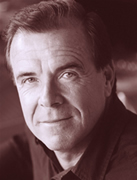Misha Dichter’s reputation is large enough for him to be listed foremost among the “distinguished soloists” playing with the student orchestras at the 50th Anniversary Eastern Music Festival. Yet three days after headlining an orchestral concert at Guilford College with a performance of Mozart’s “Elvira Madigan” Piano Concerto No. 21, Dichter was still in town, lending his luster to a chamber concert in the School of Music recital hall on the UNC Greensboro campus in a program featuring the elders of the EMF Orchestra. There was no star entrance for Dichter when he appeared after intermission to anchor the Brahms Piano Quintet. Since he seated himself upstage of his fellow musicians, Dichter was in fact virtually invisible until he took his bows at the end of the concert.
Dichter’s finesse with Mozart was certainly missed in the early part of the concert, but not sorely. Gideon Rubin had a fine feel for the idiom in the E-flat piano quartet, but a little of the nimble grace required for the swiftest runs to truly scintillate was missing in the opening Allegro. Compared with its effect on the keyboard’s treble, the hall’s warm acoustic was also kinder to the efforts of Shawn Weil on violin and Mara Gearman on viola when they took the lead. Slowed down in the darker mood of the middle-movement Larghetto, Rubin’s interplay with Weil was finely poised after cellist Danielle Guideri set the tone. Dialogue between the piano and the string trio was invigorating throughout the closing Allegretto, though Rubin again wasn’t ideally clean in the treble. Better to pay attention to the fine blending of the strings and the sure handling of the music’s pulse.
Rubin partnered brilliantly with Gearman in a rarely heard viola sonata, Benjamin Britten’s nine-part Lachrymae, reflections on a song of Dowland. While it would have been helpful to have a prelude giving us a better idea of what the Elizabethan composer’s song sounded like, there was no mistaking Britten’s concept of the lachrymose in the opening Lento, where narrow-intervallic passages double-bowed on the viola float over spare chromatic accompaniment from the piano. If there was any glimpse of any kind at Dowland’s original, it surely came in the ensuing Allegretto molto comodo, the only movement that even distantly resembled Renaissance music. Otherwise, the dreary temper of the suite came upon us with hardly any respite, though variety was plentiful in its restricted spectrum. Agitation peeped into the Tranquillo movement, anger and bitterness softened into a regretful tenderness in the Allegro con moto, and a hint of syncopation jazzed up the outburst of the Appassionato. The final three movements arced toward resignation – or acceptance – as the meditative mood of the Alla valse built to the foreboding of the Allegro marcia before melting lyrically into the concluding L’istesso tempo.
Visible or not, Dichter’s presence instantly lifted the music-making to a higher plane – but not without some welcome assistance. Jeffrey Multer, concertmaster for both the EMF and Florida Orchestras, substituted for the musician listed in the program on first violin. Immediately, Multer helped Dichter ignite the introductory measures of the Allegro non troppo, anchoring a string quartet that was excitingly assertive. Nor was there a lack of subtlety from Multer as the strings became more subdued beneath the piano’s lead in the ensuing Andante as Dichter’s big sound stood in bolder relief. Chances for the other string players to shine came mostly in the very Beethoven-like Scherzo after Dichter poured on the turbulence. In its wake, cellist David Ledoux initiated the reprise of the main theme with some delicate pizzicato and Gearman had a moment of solo space on viola before a rampaging climax. The passionate theme of the Finale, strategically slackening the pace at its outset, was triggered by Multer and massively swept up by Dichter. Then these two heavyweights led the charge into the concluding presto tempo as the Quintet surged to its thrilling conclusion. As Dichter fueled this magnificent Brahms, the only improvement I could have asked for was a clear view as he played.












